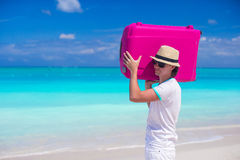The larger and heavier your luggage, the more at risk you are for neck, back, and shoulder injuries. Lifting and carrying bulky luggage can strain your bones, muscles, and joints. In addition, most airlines now charge additional fees based on the weight of your luggage. According to the US Consumer Product Safety Commission, more than 54,000 people were treated in hospital emergency rooms, doctors’ offices, clinics and other medical settings for injuries related to luggage in 2009. Injuries to the back, neck, and shoulder may be caused by struggling with heavy, over-packed luggage.
To avoid injury, the American Academy of Orthopaedic Surgeons (AAOS) urges you to use proper judgment when packing, lifting, and carrying luggage. The Academy offers the following tips for lifting and carrying luggage: Look for a sturdy, light, high-quality, and transportable pieces when shopping for luggage. Choose luggage with wheels and a handle. Avoid purchasing luggage that is too heavy or bulky when empty. Use smart packing techniques and pack lightly. When possible, place items in a few smaller bags instead of one large luggage piece. To lift luggage, stand alongside of it and bend at the knees. Try to limit bending at the waist. Lift the luggage with your leg muscles. Grasp the handle and straighten up. Once you lift the luggage, hold it close to your body.
Do not twist when lifting and carrying luggage. Point your toes in the direction you are headed and turn your entire body in that direction. Do not rush when lifting or carrying a suitcase. If it is too cumbersome, get help. Do not carry bulky luggage for long periods of time. When possible, use the airline’s baggage claim service when traveling with heavier items. Carry pieces in both of your hands rather than one hand off to the side. This can decrease stress to the spine. Less weight on any one arm can also reduce the risk of developing “suitcase elbow,” a chronic condition similar to “tennis elbow.”
When placing luggage in an overhead compartment, first lift it onto the top of the seat. Placed your hands on the left and right sides of the suitcase and lift it up. If your luggage has wheels, make sure the wheel-side is set in the compartment first. Once wheels are inside, put one hand atop the luggage and push it to the back of the compartment. To remove the luggage, reverse this process. When using a backpack, make sure it has two padded and adjustable shoulder straps to equally balance the weight. Choose a backpack with several compartments to secure various-sized items, packing the heavier things low and towards the center. Slinging a backpack over one shoulder does not allow weight to be distributed evenly. This can cause muscle strain. When using a duffel or shoulder bag, do not carry it on one shoulder for any length of time. Be sure to switch sides often. Do not drag rolling luggage when climbing stairs–carry it instead.
EHS- Online Profile
Essential Health Supplies caters to travelers and islanders alike who require mobility equipment, medical and health supplies in Aruba. Conveniently located adjacent to Aruba’s main Hospital and minutes away from most Hotels, Essential carries a diversity of medical equipment for sale and for rent for travelers with disabilities or injuries or merely for travelers requiring more accessibility. Essential offers a quick and convenient option delivering all rentals free to all Hotels, including evenings and weekends. Essential is open Monday thru Friday 8:30 am to 6:00 pm and Saturday from 10am-2:00pm. To contact or book a rental call (297)587-0940 or for emergency services during off hours call (297) 563-0415. For online booking visit www.essentialaruba.com. or write to info@essentialaruba.com .




